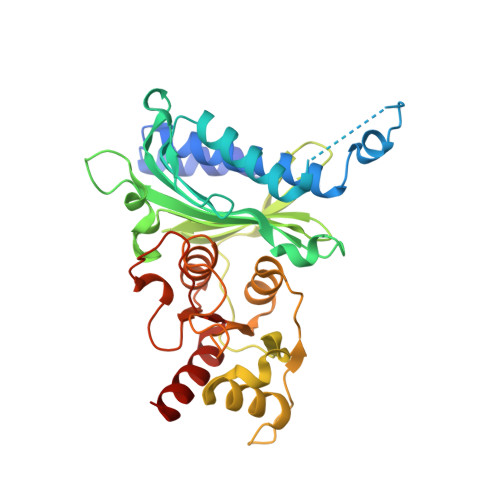Tryptophan fluorescence reveals the conformational state of a dynamic loop in recombinant porcine fructose-1,6-bisphosphatase.
Nelson, S.W., Iancu, C.V., Choe, J.Y., Honzatko, R.B., Fromm, H.J.(2000) Biochemistry 39: 11100-11106
- PubMed: 10998248
- DOI: https://doi.org/10.1021/bi000609c
- Primary Citation of Related Structures:
1FJ6, 1FJ9 - PubMed Abstract:
Wild-type porcine fructose-1,6-bisphosphatase (FBPase) has no tryptophan residues. Hence, the mutation of Try57 to tryptophan places a unique fluorescent probe in the structural element (loop 52-72) putatively responsible for allosteric regulation of catalysis. On the basis of steady-state kinetics, circular dichroism spectroscopy, and X-ray crystallography, the mutation has little effect on the functional and structural properties of the enzyme. Fluorescence intensity from the Trp57 mutant is maximal in the presence of divalent cations, fructose 6-phosphate and orthophosphate, which together stabilize an R-state conformation in which loop 52-72 is engaged with the active site. The level of fluorescence emission decreases monotonically with increasing levels of AMP, an allosteric inhibitor, which promotes the T-state, disengaged-loop conformation. The titration of various metal-product complexes of the Trp57 mutant with fructose 2,6-bisphosphate (F26P(2)) causes similar decreases in fluorescence, suggesting that F26P(2) and AMP individually induce similar conformational states in FBPase. Fluorescence spectra, however, are sensitive to the type of divalent cation (Zn(2+), Mn(2+), or Mg(2+)) and suggest conformations in addition to the R-state, loop-engaged and T-state, loop-disengaged forms of FBPase. The work presented here demonstrates the utility of fluorescence spectroscopy in probing the conformational dynamics of FBPase.
Organizational Affiliation:
Department of Biochemistry, Biophysics, and Molecular Biology, Iowa State University, Ames, Iowa 50011, USA.


















